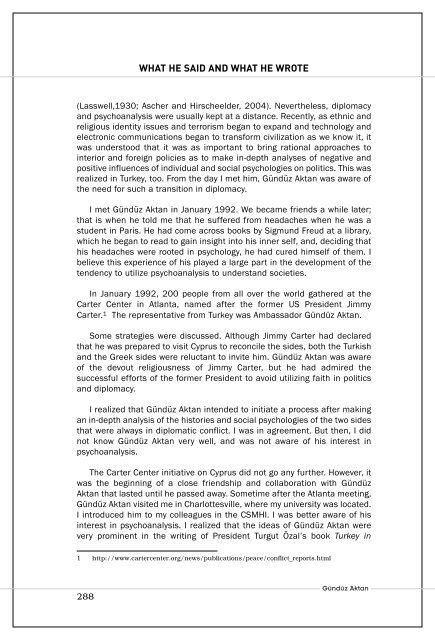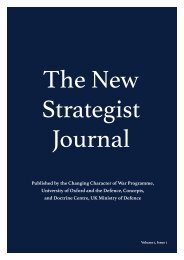gunduz-aktan-kitap-soyledikleri-ve-yazdiklari
gunduz-aktan-kitap-soyledikleri-ve-yazdiklari
gunduz-aktan-kitap-soyledikleri-ve-yazdiklari
You also want an ePaper? Increase the reach of your titles
YUMPU automatically turns print PDFs into web optimized ePapers that Google loves.
WHAT HE SAID AND WHAT HE WROTE<br />
(Lasswell,1930; Ascher and Hirscheelder, 2004). Ne<strong>ve</strong>rtheless, diplomacy<br />
and psychoanalysis were usually kept at a distance. Recently, as ethnic and<br />
religious identity issues and terrorism began to expand and technology and<br />
electronic communications began to transform civilization as we know it, it<br />
was understood that it was as important to bring rational approaches to<br />
interior and foreign policies as to make in-depth analyses of negati<strong>ve</strong> and<br />
positi<strong>ve</strong> influences of individual and social psychologies on politics. This was<br />
realized in Turkey, too. From the day I met him, Gündüz Aktan was aware of<br />
the need for such a transition in diplomacy.<br />
I met Gündüz Aktan in January 1992. We became friends a while later;<br />
that is when he told me that he suffered from headaches when he was a<br />
student in Paris. He had come across books by Sigmund Freud at a library,<br />
which he began to read to gain insight into his inner self, and, deciding that<br />
his headaches were rooted in psychology, he had cured himself of them. I<br />
belie<strong>ve</strong> this experience of his played a large part in the de<strong>ve</strong>lopment of the<br />
tendency to utilize psychoanalysis to understand societies.<br />
In January 1992, 200 people from all o<strong>ve</strong>r the world gathered at the<br />
Carter Center in Atlanta, named after the former US President Jimmy<br />
Carter. 1 The representati<strong>ve</strong> from Turkey was Ambassador Gündüz Aktan.<br />
Some strategies were discussed. Although Jimmy Carter had declared<br />
that he was prepared to visit Cyprus to reconcile the sides, both the Turkish<br />
and the Greek sides were reluctant to invite him. Gündüz Aktan was aware<br />
of the devout religiousness of Jimmy Carter, but he had admired the<br />
successful efforts of the former President to avoid utilizing faith in politics<br />
and diplomacy.<br />
I realized that Gündüz Aktan intended to initiate a process after making<br />
an in-depth analysis of the histories and social psychologies of the two sides<br />
that were always in diplomatic conflict. I was in agreement. But then, I did<br />
not know Gündüz Aktan <strong>ve</strong>ry well, and was not aware of his interest in<br />
psychoanalysis.<br />
The Carter Center initiati<strong>ve</strong> on Cyprus did not go any further. Howe<strong>ve</strong>r, it<br />
was the beginning of a close friendship and collaboration with Gündüz<br />
Aktan that lasted until he passed away. Sometime after the Atlanta meeting,<br />
Gündüz Aktan visited me in Charlottesville, where my uni<strong>ve</strong>rsity was located.<br />
I introduced him to my colleagues in the CSMHI. I was better aware of his<br />
interest in psychoanalysis. I realized that the ideas of Gündüz Aktan were<br />
<strong>ve</strong>ry prominent in the writing of President Turgut Özal’s book Turkey in<br />
1 http://www.cartercenter.org/news/publications/peace/conflict_reports.html<br />
288<br />
Gündüz Aktan



